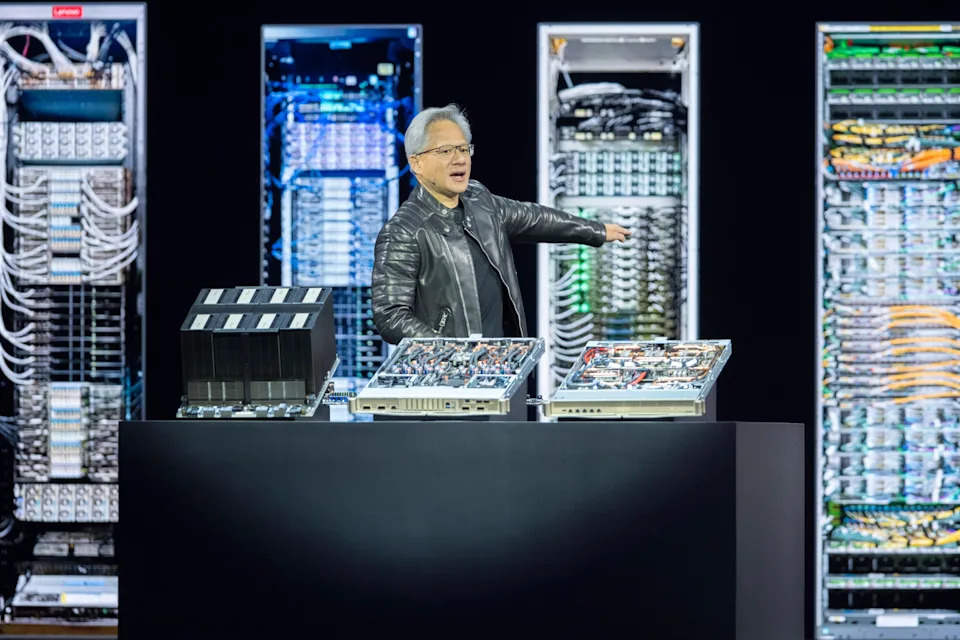Thank you! Your submission has been received!
Oops! Something went wrong while submitting the form.

Trump tariffs live updates: US moves to levy Chinese ships as Trump softens rhetoric
Key Points
- The US has imposed new tariffs on Chinese ships docking at US ports, escalating the trade war between the two largest economies.
- President Trump expressed optimism about negotiations with China, suggesting a potential deal and reluctance to further increase tariffs.
- China has shown openness to trade talks with the US, despite facing high tariffs on its imports.
- The trade conflict has led to retaliatory actions, with China raising duties on US goods and the US imposing various tariffs on Chinese imports.
- Global economic concerns are rising, with Japan and the EU expressing worries about the impact of US trade policies.
Summary
The US has escalated its trade war with China by imposing new tariffs on Chinese ships docking at US ports. President Trump has expressed optimism about negotiations with China, hinting at a potential deal and a reluctance to further increase tariffs, citing concerns over consumer spending. Despite the high tariffs, China has shown a willingness to engage in trade talks with the US, although the White House has clarified that China faces tariffs up to 245% on its imports. The trade conflict has led to retaliatory measures, with China increasing its duties on US goods to 125% and the US implementing a range of tariffs on Chinese imports, including a 125% reciprocal tariff, a 20% tariff related to the fentanyl crisis, and Section 301 tariffs between 7.5% and 100%. This tit-for-tat escalation has raised global economic concerns, with Japan and the EU expressing apprehension about the broader impact of US trade policies. Meanwhile, the US Treasury Secretary remains optimistic about achieving clarity on tariffs and progress in key trade deals, amidst ongoing discussions with other countries like Japan, Mexico, and Italy.
yahoo
April 18, 2025
Stocks

Jay Powell made it clear Fed is not going to rescue markets
Key Points
- Jerome Powell, Federal Reserve Chair, explicitly stated that there will be no immediate intervention in the bond market or changes in interest rates despite market volatility.
- Powell emphasized the Fed's commitment to managing inflation, particularly in light of potential inflationary pressures from tariffs.
- Markets are expected to remain volatile due to ongoing uncertainties, but Powell views them as functioning normally under these conditions.
- President Trump expressed strong dissatisfaction with Powell's policies, hinting at potential dismissal, though no final decision has been made.
Summary
Federal Reserve Chair Jerome Powell made it clear during a speech at the Economic Club of Chicago that the central bank would not intervene in the bond market or adjust interest rates in response to recent market turmoil, which was partly triggered by President Trump's tariffs. Powell dismissed the notion of a "Fed put," indicating that markets should not expect the Fed to act as a safety net. He highlighted the market's ability to handle uncertainty, describing the current situation as markets processing unique developments. Despite pressures from rising bond yields and expectations for rate cuts to mitigate economic downturns or inflation, Powell stated the Fed would wait for clearer economic signals before making any policy changes. His comments suggest a focus on controlling inflation over stimulating growth, which has not sat well with President Trump, who has publicly criticized Powell and hinted at his potential removal from office. Powell, however, reaffirmed the independence of the Federal Reserve, stating that his actions would not be swayed by political pressures.
yahoo
April 18, 2025
Stocks

Apple's China smartphone shipments slide 9% in first quarter
Key Points
- Apple's smartphone shipments in China fell by 9% in Q1, marking its seventh consecutive quarter of decline.
- Apple was the only major manufacturer to experience a decline in shipments, with its market share dropping to 13.7%.
- Xiaomi, the market leader, saw a 40% increase in shipments during the same period.
- Government subsidies introduced in January did not benefit Apple due to its premium pricing strategy.
Summary
Apple Inc. faced a challenging first quarter in China, with its smartphone shipments declining by 9% year-over-year, according to IDC data. This decline marks Apple's seventh consecutive quarter of falling shipments, positioning it as the only major smartphone manufacturer to experience such a downturn. Apple's shipments totaled 9.8 million units, reducing its market share to 13.7% from 17.4% in the previous quarter. In stark contrast, Xiaomi, the market leader, saw its shipments surge by 40% to 13.3 million units. The introduction of government subsidies in January, aimed at boosting consumer electronics sales by refunding 15% on products priced under 6,000 yuan, did not help Apple due to its premium pricing strategy. This pricing model has prevented Apple from capitalizing on the market growth spurred by these subsidies, highlighting a strategic challenge for the company in one of its key markets.
yahoo
April 18, 2025
Stocks

Fed's Powell is an exemplary central banker, ECB's Villeroy says
Key Points
- Jerome Powell is praised for his professionalism and courage by ECB policymaker Francois Villeroy de Galhau.
- Powell has faced criticism from President Trump for not cutting interest rates, despite Powell's warnings about the economic impacts of tariffs.
- Villeroy defends Powell's approach, emphasizing the importance of a central banker's independence and truthfulness.
- The ECB has cut rates multiple times, contrasting with the Fed's stance, amid concerns over U.S. tariffs affecting global economic growth.
Summary
In a recent statement, European Central Bank (ECB) policymaker Francois Villeroy de Galhau praised U.S. Federal Reserve Chair Jerome Powell for his exemplary conduct as a central banker, highlighting his independence and commitment to truthfulness despite political pressures. President Donald Trump has openly criticized Powell for not reducing interest rates, accusing him of playing politics. Powell, however, has indicated that rate cuts are unlikely in the near future and has expressed concerns over the potential inflationary and unemployment effects of the Trump administration's tariff policies. Villeroy commended Powell's approach, noting that a central banker must remain independent and truthful, especially in challenging economic climates. Meanwhile, the ECB has been more aggressive with rate cuts, responding to easing inflation and the economic pressures from U.S. tariffs, with Villeroy suggesting that inflation risks might currently be on the downside. This contrast in monetary policy approaches between the Fed and the ECB underscores the differing economic strategies amidst global trade tensions.
yahoo
April 18, 2025
Stocks

Congress Is Prioritizing a Tax Break That Few Americans Will Claim
Key Points
- The state and local tax (SALT) deduction is a contentious issue in Congress, primarily benefiting a small percentage of high-income earners.
- Despite its limited impact, the SALT cap is likely to be increased due to political pressure from key swing districts.
- Six House Republicans are strongly advocating for a significant increase in the SALT cap, with one proposing to raise it to $100,000.
- The average taxpayer in these districts does not benefit much from the SALT deduction, as most opt for the standard deduction.
- The GOP needs the support of these key districts to pass the tax bill and retain control in future elections.
Summary
The state and local tax (SALT) deduction, a focal point of fiscal debate in Congress, primarily benefits a small group of high-income earners, yet it has become a significant political issue. Despite its limited reach, with only about 10% of taxpayers itemizing their taxes to claim it, the SALT cap is poised for an increase due to pressure from key swing districts in New York, New Jersey, and California. These districts, represented by six House Republicans, are pushing for a higher cap, with one proposal suggesting an increase to $100,000. However, data indicates that even in these areas, the average taxpayer does not significantly benefit from the SALT deduction, as most opt for the standard deduction. The political necessity to cater to these districts stems from the GOP's need to pass their tax bill and maintain control in upcoming elections, highlighting the strategic importance of these regions. This situation underscores the complex interplay between fiscal policy and political strategy, where a minority's tax benefits can influence broader legislative outcomes.
yahoo
April 18, 2025
Stocks

Google's bad year just got worse: Morning Brief
Key Points
- Google has been found by a federal court to have abused its market power for the second time in a year, potentially facing significant legal consequences.
- Alphabet, Google's parent company, has underperformed compared to other tech giants, struggling with AI advancements and cloud computing revenue.
- The company is navigating geopolitical tensions, including a brewing trade battle between the US and China, which could impact its advertising revenue.
- Google is attempting to diversify its business, moving away from search towards becoming a major player in cloud computing with acquisitions like Wiz for $32 billion.
Summary
Google faces multiple challenges as it navigates legal, market, and geopolitical landscapes. A federal court has ruled against Google for the second time in a year, citing abuse of market power, which could lead to significant legal repercussions including potential restructuring. Alphabet, Google's parent, has been lagging behind its tech peers, particularly in AI and cloud computing, with its stock declining by 20% in 2025. The company's CEO, Sundar Pichai, has set ambitious goals for its Gemini chatbot, aiming for widespread adoption. Amidst these issues, Google is also dealing with international trade tensions, especially with China, which could affect its core advertising business. In response to these challenges, Google is diversifying, with a notable move into cybersecurity through the acquisition of Wiz, aiming to bolster its cloud computing capabilities. However, these efforts to expand and adapt might also intensify regulatory scrutiny, potentially altering the company's structure and operations in the future.
yahoo
April 18, 2025
Stocks

Tokyo leads gains in most Asian markets on trade deal hopes
Key Points
- Tokyo led Asian markets higher on optimism about a Japan-US trade deal.
- Trump's reluctance to hike tariffs on China provided some market support.
- Japanese negotiator Ryosei Akazawa met with Trump and US officials, with more talks planned.
- Trump criticized Federal Reserve Chairman Jerome Powell for not cutting interest rates.
- US inflation and tariffs are causing economic ripples, affecting consumer confidence.
Summary
Asian markets, particularly Tokyo, saw gains on Friday, driven by optimism surrounding a potential Japan-US trade deal. This optimism was bolstered by US President Donald Trump's comments indicating a reluctance to further increase tariffs on China, which provided some relief to investors amidst ongoing trade tensions. Japanese negotiator Ryosei Akazawa's recent visit to the US, although not immediately fruitful, has set the stage for further discussions aimed at reducing the high tariffs imposed by Trump. Meanwhile, Trump has openly criticized Federal Reserve Chairman Jerome Powell for not lowering interest rates, amidst rising US inflation and economic uncertainty caused by his tariff policies. These policies have not only complicated the Fed's role but also led to a noticeable drop in consumer confidence. Additionally, the US has introduced new port fees on Chinese ships, potentially escalating tensions further. Despite these developments, markets in several major cities were closed for holidays, and investors remain cautious due to the unpredictability of Trump's trade policies.
yahoo
April 18, 2025
Stocks

How Meta’s antitrust case could dampen AI development
Key Points
- The FTC alleges that Meta’s strategy of absorbing firms violates antitrust laws, potentially forcing Meta to spin out its various messenger services and social media sites into independent companies.
- A ruling against Meta could harm its competitiveness in AI development by limiting access to data from its social media platforms for training AI models.
Summary
The Federal Trade Commission (FTC) has initiated antitrust proceedings against Meta, alleging that the company's strategy of acquiring competitors rather than competing with them violates antitrust laws. This case, which began in 2021, could lead to Meta being required to separate its various services like Instagram, WhatsApp, and Messenger into independent entities. Such a ruling would not only impact Meta's dominance in the social media market but also its ability to develop AI technologies, particularly its Llama AI models, which rely on data from these platforms. The trial's outcome could take months to a year, but its implications for Meta's AI development and its competitive edge in the tech industry are significant. Moreover, Meta's recent pause on AI model rollout in the EU due to regulatory concerns highlights the broader implications of data usage in AI training. If Meta loses the case, it would face restrictions on using data from its now-independent platforms, potentially affecting its AI capabilities unless new data-sharing agreements are established. However, Meta could still leverage data from its remaining services and explore alternative data sources to continue its AI advancements.
cointelegraph
April 18, 2025
Stocks

Nvidia stock falls again, market cap losses near $270 billion after Trump administration's new export controls
Key Points
- Nvidia's stock fell nearly 3% after disclosing a $5.5 billion hit due to US government export bans to China.
- The company's market cap dropped by $266 billion since the trade rules were tightened.
- Analysts predict a significant revenue loss for Nvidia, with estimates ranging from $10 billion to $16 billion.
- Nvidia plans to invest $500 billion in US AI infrastructure over the next four years.
- Other chip companies like AMD, Broadcom, and Intel also experienced stock declines.
Summary
Nvidia's stock experienced a significant decline of nearly 3% on Thursday, following a 7% drop the previous day, after the company disclosed that the US government had imposed new export restrictions on its chips to China. This resulted in a $5.5 billion hit to Nvidia's first-quarter earnings due to the ban on sales of its H20 chips, specifically designed for the Chinese market. The stock's fall reduced Nvidia's market capitalization by $266 billion. Analysts from JPMorgan and Jefferies estimated that Nvidia could lose between $10 billion to $16 billion in revenue due to these restrictions. Despite the downturn, Nvidia's CEO Jensen Huang announced plans to invest heavily in US AI infrastructure. Other semiconductor companies like AMD, Broadcom, and Intel also saw their stocks decline, although less severely, amidst these trade tensions. Meanwhile, TSMC reported profits that exceeded expectations, highlighting the ongoing demand for AI chips.
yahoo
April 18, 2025
Stocks